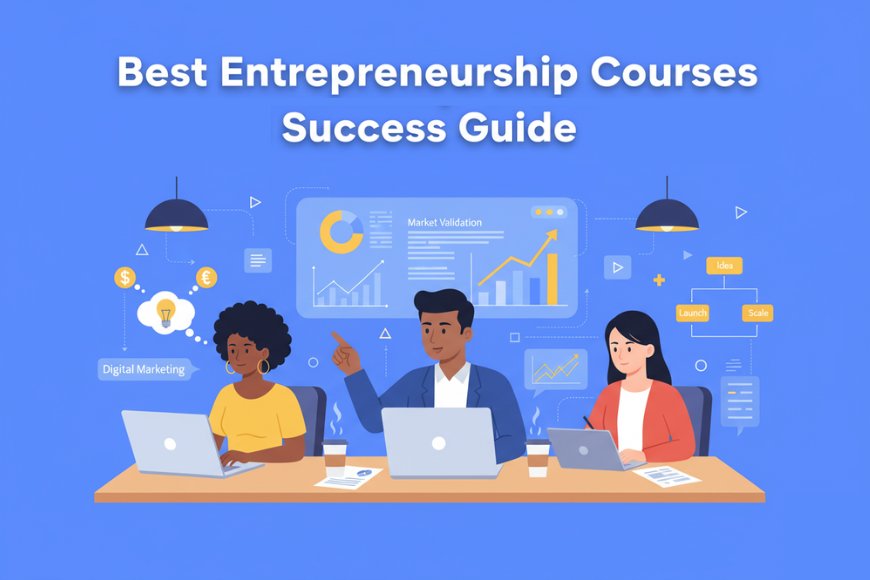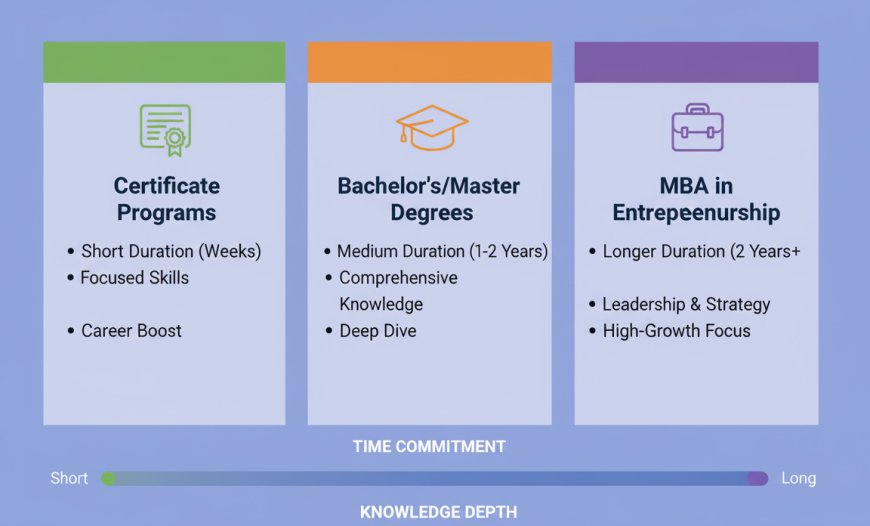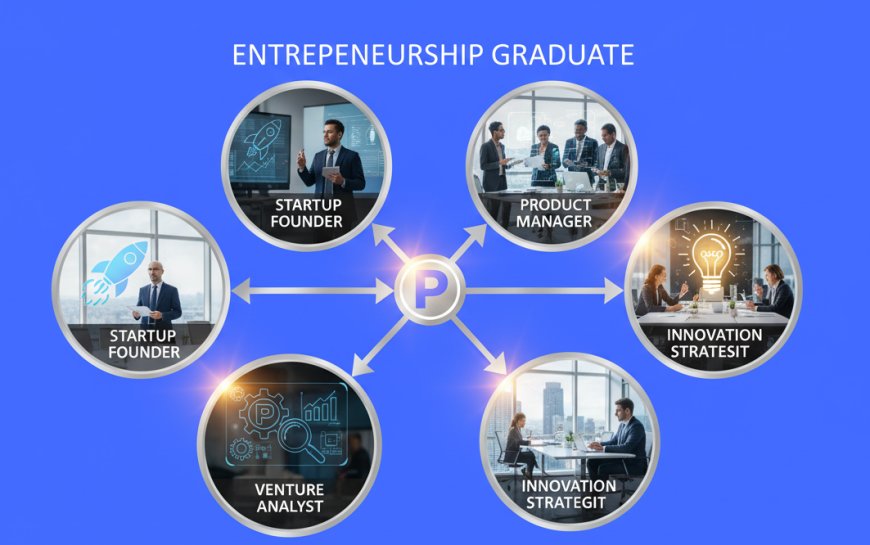Best Entrepreneurship Courses for 2025 Success Guide
Discover the best entrepreneurship courses for 2025 that teach real-world startup skills, innovation, and business growth. Learn from top platforms like Coursera, MIT, and Harvard Online to start or scale your business successfully.

Jump to Section:
1. Introduction: Why Entrepreneurship Courses Matter in 2025
The global economy in 2025 is defined by the startup culture and an unprecedented online business boom. Whether you're planning a tech startup, a lucrative side hustle, or a service-based freelancing business, formal training is no longer optional—it's essential.
Traditional business methods simply can't keep up with the pace of digital change and innovation. By enrolling in structured entrepreneurship courses, you dramatically reduce the risk of failure.
These programs equip you with proven frameworks for market validation, financial forecasting, and scaling, transforming a risky guess into a calculated business venture. They teach you to pivot faster, secure funding smarter, and build an impactful brand from day one. In a world full of competition, structured education is your strategic advantage to survive and thrive.

⭐ My Real-World Experience
When I started my first online service project, I spent too much time on guesswork. It wasn't until I enrolled in a structured course that I realized how frameworks like the Business Model Canvas and Lean Startup method made business planning much easier and less risky.
This guide is built on the experience that formal learning saves you months of trial-and-error, allowing you to focus on effective execution and scaling from the beginning.
2. What Are Entrepreneurship Courses?
Entrepreneurship courses are structured educational programs designed to teach the process of starting, running, and scaling a business. They go beyond simple management theory, focusing heavily on innovation, risk-taking, and market disruption.
These courses come in various formats, including short certificate programs (like those offered on Coursera or edX), full Bachelor's and Master's degrees, and specialized MBA programs for seasoned professionals.
While short courses focus on specific, immediately applicable skills (e.g., product validation or digital marketing), academic programs provide a deep theoretical foundation in economics, finance, and organizational behavior. Structured education matters because it helps you identify opportunities, secure funding, and navigate complex legal and financial landscapes—all critical steps for a successful launch.

3. Best Online Entrepreneurship Courses (Top Platforms in 2025)
The top online platforms now host highly credible entrepreneurship certificates taught by leading universities. The Entrepreneurship Specialization from the University of Pennsylvania (Coursera) is a gold standard, covering idea development, financing, and scaling.
For a more intensive, hands-on experience, MIT's "Entrepreneurship 101" (edX) uses the rigorous Disciplined Entrepreneurship framework. If you need speed and practical tools, look for a top-rated Udemy "How to Start a Business" best-seller, often available for a low cost.
For prestige, Harvard Online’s Entrepreneurship Essentials offers a high-credibility short program. Lastly, for foundational skills, Google Digital Garage provides free lessons in digital marketing and effective online presence, which are non-negotiable for any 2025 startup. Always check for courses that include portfolio-building projects and mentor access.
4. Entrepreneurship Degrees and Certificates
For those committed to a deep dive or a career in venture capital, academic paths are invaluable. An Online Entrepreneurship Degree (Bachelor's or Master's) provides a comprehensive curriculum, blending business theory with applied startup skills.
The MBA in Entrepreneurship is tailored for mid-career professionals and established founders, offering advanced strategy, finance, and leadership training with a strong focus on high-growth ventures.
Institutions like Wharton, Stanford, and the London School of Business offer specialized programs that carry immense global credibility. Alternatively, a Graduate Certificate in Entrepreneurship provides a short, credible academic credential without the time commitment of a full degree, often covering core skills like financial modeling and venture law. Choosing a degree signals long-term commitment and opens doors to elite networking opportunities.
5. Specialized Courses for Startups and Small Businesses
Beyond general education, specialized programs exist to cater to unique business needs. For beginners launching a product or service with minimal capital, small business startup courses focus on immediate revenue generation, local marketing, and simple financial management.
The 2025 landscape demands expertise in digital entrepreneurship courses, which emphasize e-commerce, content monetization, and platform-specific marketing (TikTok, Instagram, etc.).
For high-growth, scalable tech ideas, intensive practical startup programs like those offered by Y Combinator (Startup School) or Founder Institute are vital. These accelerators and incubators offer mentorship and access to investor networks, focusing ruthlessly on product-market fit and rapid growth. Choosing a specialized course ensures your learning is directly applicable to your business model, whether you're building a hyper-local shop or the next unicorn startup.
6. Key Skills You’ll Learn
The value of an entrepreneurship course lies in the transferable skills you acquire, which are critical in any job market. First, you master Business Model Design using tools like the Business Model Canvas, ensuring your idea is viable.
Second, you develop Innovation and Leadership skills, learning to spot opportunities and lead a team through uncertainty. Third, Digital Marketing becomes your expertise, covering everything from SEO and paid ads to content strategy.
Fourth, Financial Management teaches you budgeting, cash flow analysis, and pricing strategies to maintain profitability. Finally, you gain essential skills in Fundraising and Networking, learning to craft pitches, secure seed money, and build valuable professional connections. These are the engines that turn a simple idea into a running business machine.

7. How to Choose the Right Entrepreneurship Course
Selecting the ideal course should be a strategic decision based on your goals. First, define your objective: Do you want to launch a specific startup, earn a credible degree, or simply switch careers?
For a quick launch, a project-based course that forces you to build a minimum viable product (MVP) is best. For career credibility, focus on courses with recognized accreditation from reputable universities like Wharton or MIT.
Crucially, look for programs that offer access to mentors and industry experts—their guidance is often worth more than the curriculum itself. Finally, prioritize certification and real-world projects that you can proudly showcase on your GitHub or LinkedIn profile, proving your ability to execute, not just theorize. Use a checklist to compare the curriculum and mentorship support before investing your time and money.
8. Career Opportunities After Entrepreneurship Courses
While the ultimate goal is often to become a Startup Founder, entrepreneurship training opens many high-value career doors in established companies. Graduates are highly sought after as Product Managers because they understand innovation, market needs, and business viability.
They excel as Innovation Strategists, helping large corporations stay ahead of the curve. Furthermore, the financial and analytical skills learned can lead to lucrative roles like Venture Analyst in VC firms or even as a certified Startup Coach or mentor.
These roles often offer high salaries and the excitement of working with new ideas and technologies. For instance, a Product Manager with an MBA in Entrepreneurship can command a salary of $120,000+ in major tech hubs, proving that the training pays off whether you start your own company or lead innovation within another.

📚 Verified Sources & Research Data
- Coursera.org – Entrepreneurship & Business Categories (Course Credibility)
- Statista – Global Entrepreneurship Statistics & Trends (2025)
- Harvard Business Review – Startup Success and Business Strategy Reports
- OECD – SME and Entrepreneurship Statistics (Economic Authority)
9. Conclusion: Start Learning, Start Building
The window of opportunity in the 2025 market is wide open, but it requires more than just a great idea—it demands structured knowledge and execution. By investing in a high-quality entrepreneurship course, you are investing in the essential skills needed to minimize risk, secure funding, and scale your operations successfully.
Don't let fear of the unknown stop you; let formal education be the foundation of your confidence. The most successful entrepreneurs are lifelong learners who leverage proven frameworks instead of reinventing the wheel. Your journey from a simple idea to a profitable business starts with the first course you complete.
Pick one entrepreneurship course today and start building your dream business.
👤 Written by Fazal Abbas
Fazal Abbas is the founder of ItsFazalBro — a digital creator, web developer, and online business educator. He shares practical guides on freelancing, AI tools, and online income growth to help beginners achieve financial freedom.







